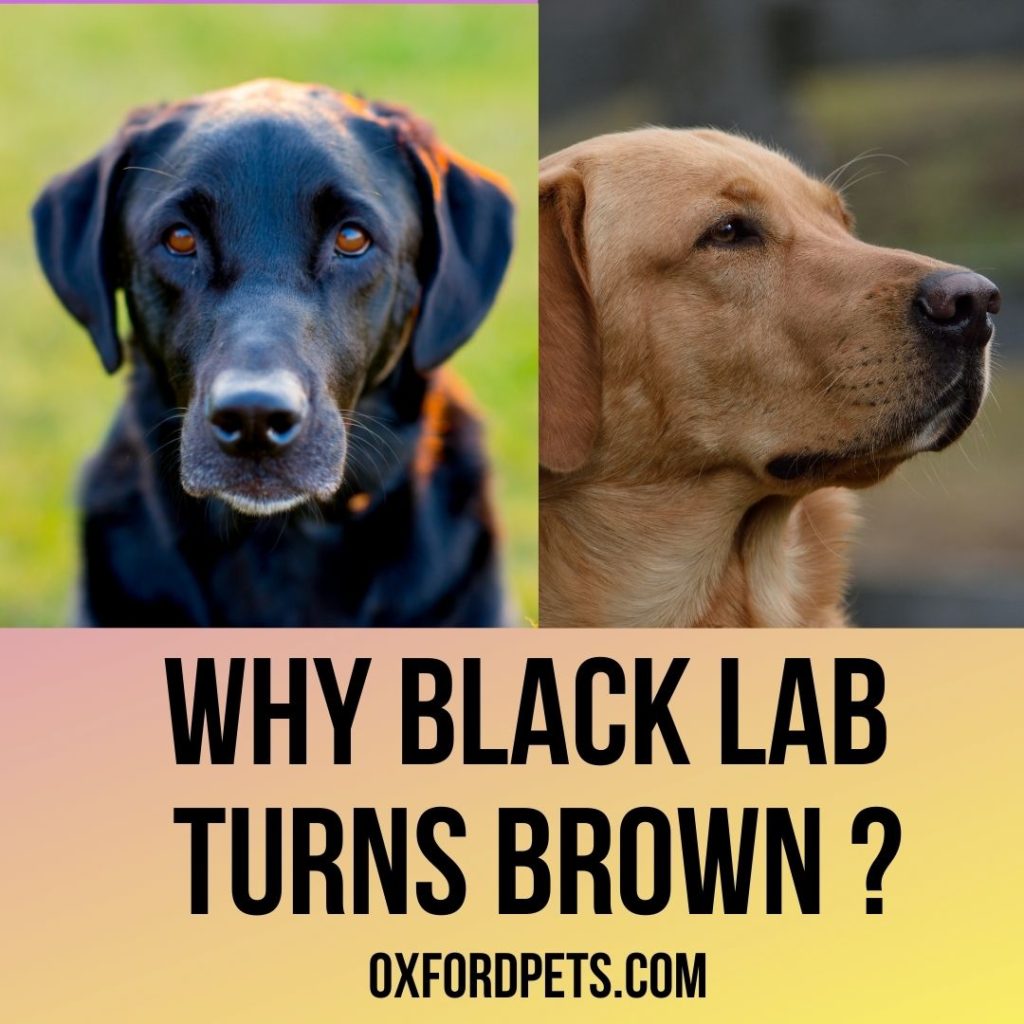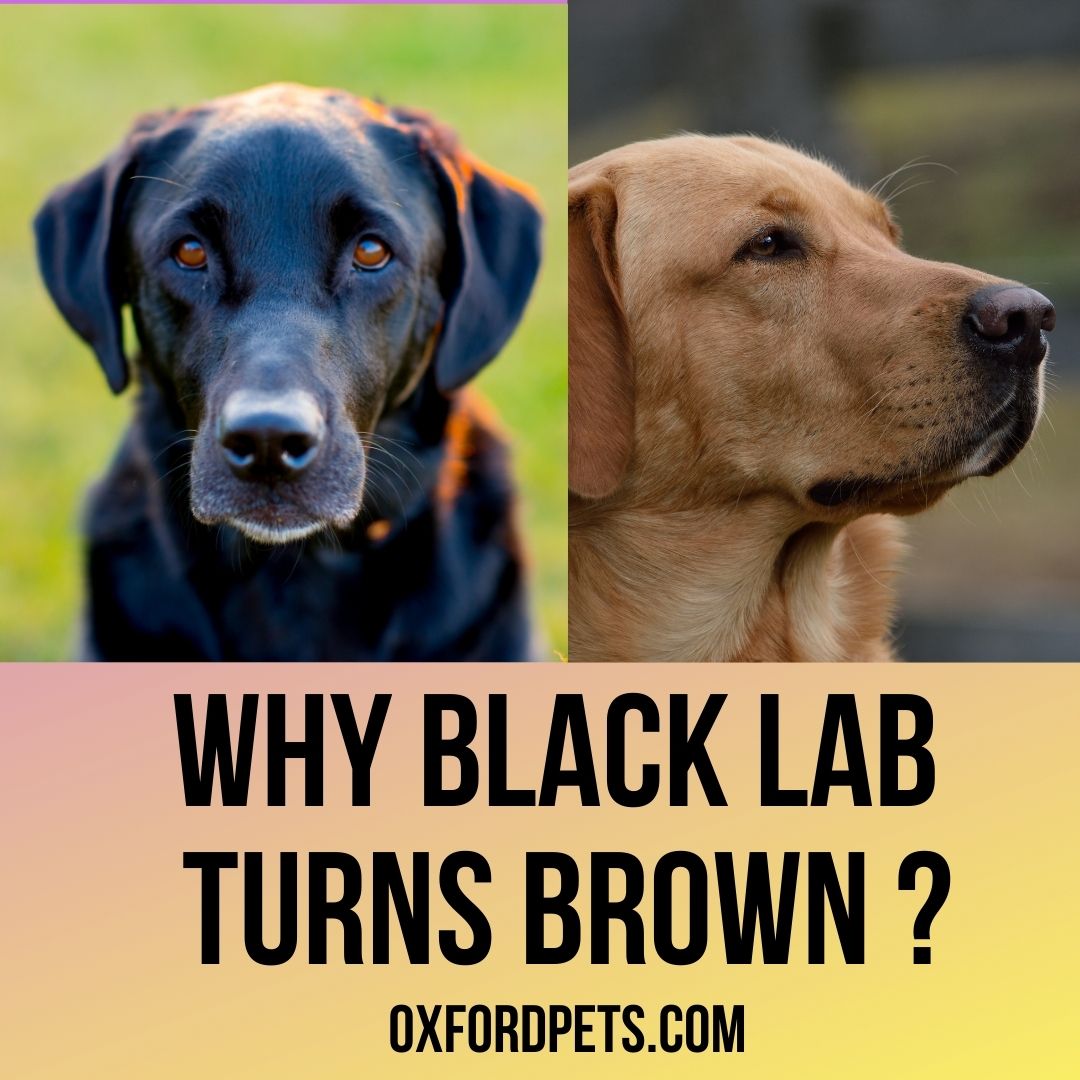When getting a Labrador, or any other dog, coat color is one significant concern amongst pet enthusiasts. While people are particular about dog breeds, they are also very keen about what color their dog should be. However, several pet parents must have noticed that even after getting their pet dog in a particular color, the canine shows some differences in coat shade while growing up.
Dog’s coat color can change due to a number of reasons. If your Black Labrador is turning Brown in color, it is probably due to aging. Some dogs turn Brown from Black when they are exposed to direct sunlight for extended periods. Finally, it is probably a result of the bleaching effect due to consistent sunlight subjection. The reasons for changing coat color aren’t limited, but the list can go long. Here we have a detailed guide for those pet owners who are concerned about their Lab’s coat changing color from Black to Brown. The same ideology may also apply to other Black dogs who are experiencing sudden discoloration in their coat color.

Contents
- Does A Black Lab Change Color?
- Can A Black Labrador Turn Brown? Why Did My Black Dog Turn Brown?
- Black Labrador turning Brown (Biological Reasons)
- Black Labrador turning Brown (Environmental Reasons)
- Can A Labrador Puppy’s Coat Change Color?
- Genetics Of Labrador Coat Color
- Chocolate Lab Vs. Black Lab
- Does the Color of the Labrador Retrievers Coat Affect Behavior?
- Wrapping up…
Does A Black Lab Change Color?
A Black Labrador Retriever can change color under different given circumstances of life. However, no matter what color transition (natural) the dog is going through, he will always keep the original color-coded appearance in his genetics.
Black Labrador’s coat gets lighter as they age. Their hair starts fading, turning Brown, Yellow, and eventually White/ Off White. Colour transition due to aging isn’t very common for Labradors, but it isn’t uncommon as well. Also, not all dogs will necessarily experience the same or within a similar pattern.
Black Labradors who change color often remain similar to their original appearance. Their entire coat won’t turn brown or white, but only a few hair strands will show slight differences here and there. Some Black Labradors may show signs of aging due to changes in coat color; however, their physical strength won’t differ from that. Therefore, it is possible for them to stay healthy, active, and energetic and not display other signs of aging very soon.
Can A Black Labrador Turn Brown? Why Did My Black Dog Turn Brown?
Yes, it is possible for a Black Labrador to turn Brown or of a different shade. Dogs change their coat color several times throughout their life. Sometimes, the changes are significantly visible, whereas sometimes, changes are so minimal that they remain overlooked.
A Labrador’s coat color can change from Black to Brown due to a number of reasons. It reasons can be as basic as aging or as crucial as a life-threatening disease.
If you are wondering Why your Black Lab is turning Chocolate or any other Color, you got to continue reading below. Here we have classified different reasons under two categories: Biological (Physical) and Environmental (External).
Black Labrador turning Brown (Biological Reasons)
- Due to Aging: Aging is the most common, obvious, and unavoidable biological process of any living being. Be it humans, animals, or plants, every single living organism has to undergo aging, even if the processes are different. In dogs, including Labradors, Aging is apparent and has many observable changes. The major effect of aging on Labradors is skin pigmentation and changes in coat color. It happens because melanocyte cells (responsible for health and other significances of skin and hair) start decreasing. As a result, your Black Labradors’ hair may turn brown or white, his skin will start sagging, and his coat’s density too may get affected along with several other changes.
Solution: Aging is an apparent process, and there is nothing that can stop it. If your dog is experiencing any changes due to aging, there isn’t much you can do about it. Especially when the changes are cosmetic, it better try embracing them.
- Due to Hormonal Imbalance: Balanced hormones mean healthy skin and hair in dogs. However, Hormonal imbalance can hamper various body parts and functioning. So if your Black Lab is turning brown on some parts, it can be due to hormonal changes or an imbalance in the body.
Solution: Before finding the solution, make sure changes in coat color is due to hormonal changes only. You can take your Lab to the Vet and get him diagnosed for the same. Upon finding the problem, the Vet will treat your dog by replacing the missing hormone. Either oral medicine, vaccination, or changes in lifestyle with do the job.
- Due to Skin Conditions: If you are observing brown or white hair in your Black Labrador coat, there might be an underlying skin condition. For example, autoimmune diseases like Vitiligo and Lupus or conditions like Depigmentation dermatoses can make the dog lose color from different body parts, including its coat. Apart from that, such health conditions can also make the dog suffer from pain and discomfort across the skin.
Solution: Upon observing anything odd with your dog’s skin and coat, always reach a reputed vet first. A professional can determine what’s making the dog suffer and will initiate an effective treatment for the same.
- Due to Genetics/ Hereditary: Some Labradors experience changes in coat color or other pigmentation differences if such conditions are in their heredity. If your Lab parents experience changes in coat color early in their age, the child, too, can go through the same. Most of the time, it is normal, and nothing specific should worry you. However, in a few cases, diseases like Color Dilution Alopecia (CDA) move down in heredity and result in different changes in skin and hair.
Solution: If you are skeptical about Genetics/ Hereditary reasons behind your Labrador, it is better to consult a Vet. Also, meet the breeder you got your Labrador from and learn about all the diseases and conditions running in your dog’s heredity.
- Due to Life-Threatening Diseases Like Skin Cancer: Dogs can get cancer just like we humans can. Of all the cancer types, Skin Cancer can result in coat and skin discoloration, hair loss, hair thinning, rashes, bumps, and other such changes in a dog’s physical appearance.
Solution: If you are even a bit skeptical about your Labrador suffering from Skin Cancer, waste no time and consult a reputed and experienced vet soon.
Black Labrador turning Brown (Environmental Reasons)
- Due to Anxiety and Stress: It isn’t scientifically or medically proven yet, but some researches show that dogs’ coat color can change due to stress.
Solution: before concerning changes in coat color, dog owners first focus on why their dog is going through stress and anxiety. Both these mental and emotional conditions aren’t very healthy to live with and must be treated as soon as possible. Speak to a Vet immediately.
- Due to Nutritional Imbalance: A healthy diet means a nutritionally balanced one. Your dog’s daily diet must include enough amount of Protien, Vitamins, Fats, Micro and Macro Nutrients, Carbohydrates and other essential nutrition. For Color and Pigmentation, tyrosine and phenylalanine are the two responsible amino acids that should never be overlooked. Skipping them from your dog’s diet can result in changes in color in both skin and coat.
Solution. Met a Vet and ensured a healthy diet for your dog. If required, add supplements as well.
- Due to Sunlight: Excessive sunlight and exposure to UV lights and high temperatures can cause coat discoloration in dogs. It is basically the impact of bleaching that makes the black coat appear brown, yellow or white.
Solution: Coat discoloration due to sunlight exposure is often temporary. However, if it persists, it is better to consult a reputed vet.
Can A Labrador Puppy’s Coat Change Color?
Labrador puppies, though, do not change their coat color, but as they grow, their color will become dark and deep. If your Labrador puppy’s coat color is changing with time, maybe the dog is a mixed breed, and the dominance of his other parent breed is becoming more evident now.
In such a case, consult the breeder you got your Labrador from. It is crucial to have Pedigree Papers right while getting a dog since it is proof of your dog is purebred. Pedigree papers also disclose the genetic details of 3 to 4 ancestors.
Also, you can get your dog’s DNA test done to make things clearer.
Genetics Of Labrador Coat Color
‘B’ genes determine Labrador’s Coat color. Each dog inherits two ‘bee’ genes from either parent. Labradors have three different combinations of bee genes, including
- BB
- Bb
- bb
Labradors with BB genes turn out Black. This is because they do not have any traces of b genes which would have gotten them brown color.
Labradors with Bb genes turn out Brown.
Whereas Labradors with bb genes turn out Yellow.
Chocolate Lab Vs. Black Lab
Chocolate and Black Labradors can be extremely different yet similar. Though all Labradors are handsome, Black labs, due to the depth of their color, appear more exciting. They have mid to dark brown eyes, black noses and eye rims and an inside-out black coat. At the same time, Chocolate Labs have mahogany to deep, dark brown color. They, at times, may have small white patches on their chest.
When it comes to temperament, Chocolate Labradors are considered slightly quiet and less intelligent. However, this could be possibly a myth since, other than their coat color, nothing else differs much.
Does the Color of the Labrador Retrievers Coat Affect Behavior?
No, the difference in coat color does not particularly affect Labrador’s behavior. It is up to the individual dog, his lifestyle and training, and how he would turn up behavior-wise. There are also some differences between the English Lab and the American Lab’s behavior, though, but it doesn’t have anything to do with color.
Can a Labrador Retriever Completely Change Color?
In very rare chances when the dog is suffering from conditions like Vitiligo, his coat color may change completely. However, that is undoubtedly a rare scenario, and cases like these are not yet registered.
Wrapping up…
Some Black Labradors experience changes in their coat color as they turn out 7 or 8 years old. Graying of hair due to aging starts gradually and slowly. This won’t become predominant over the entire coat, but only a few traces here and there could be seen.
However, if at any given point in time you are skeptical about your Labrador’s changing coat color, consult a Vet. It is better to rule out any medical possibility before it becomes severe.
